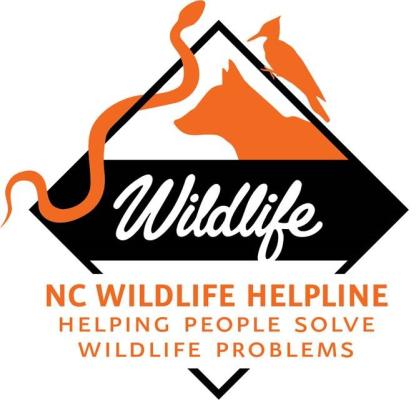Have a Wildlife Problem?

The Wildlife Helpline is open Monday through Friday, 8 a.m. to 5 p.m.
Call: 866-318-2401
Outside of business hours or for less immediate concerns, please contact our email.
Email: HWI@ncwildlife.gov
The North Carolina Wildlife Resources Commission provides technical guidance and resources to the public that help manage wildlife conflicts, injuries, and rehabilitation.
Wildlife Damage Control
In general, wild animals prefer to avoid people and live by a "you leave me alone and I'll leave you alone" strategy. In some cases, however, wildlife take advantage of food or shelter that humans provide, which can lead to conflicts. Fortunately many types of wildlife-caused damage are preventable; food sources can be removed or secured in animal-proof containers, access to buildings can be closed off or the area can be made less attractive to a certain species, and vulnerable livestock or pets can be kept in predator-proof enclosures, or closely supervised when outside.
The North Carolina Wildlife Resource Commission provides technical guidance and resources to the public that help prevent or manage wildlife conflicts. While Commission staff do not solve wildlife conflicts directly, they can provide information, issue depredation permits for animal removal, or provide referrals to licensed professionals who can provide direct assistance.
Wildlife Control Agents (WCAs) are trained and certified by the Commission, and are authorized to issue depredation permits to North Carolina residents who are having wildlife damage problems. Where damage is occurring, WCAs can issue permits for certain species on-the-spot, and may remove the animal directly. Only Commission staff can issue depredation permits for big game species (white-tailed deer, wild turkey, black bear), and protected species typically cannot be removed, or require additional restricted permits.
Learn more about wildlife control below:
- Information for current or aspiring Wildlife Control Agents about the Wildlife Control Agent Program.
- Contact a licensed Wildlife Control Agent in your area using the link below.
- Need a trapper any time October through February? Contact a licensed trapper.
- Dealing with beaver damage? Check to see if your county participates in the Beaver Management Assistance Program (BMAP) to get professional, affordable assistance.
- See solutions to many wildlife damage problems at the Wildlife Damage Management website.
- Losing poultry? Learn about protecting chickens from predators.
Want to become a Wildlife Control Agent or Wildlife Control Technician? Learn about Wildlife Control Training Opportunities...
Contact a Wildlife Control Agent
Before you call follow these steps:
- If possible, find out what species is involved.
- Learn about actions you can take yourself that may resolve the issue.
- Be aware that wildlife seen around a neighborhood or in a yard cannot be removed simply because their presence is unwanted. A professional can help you to keep wildlife out of a specific area, but can only physically remove animals that are causing property damage.
- Also know that it's normal for raccoons, foxes, and coyotes to be out during the day, especially during the spring and summer. Seeing one of these species during the day is not a valid reason to have it removed.
If you still need help resolving your issue, find Wildlife Control Agents near you.
